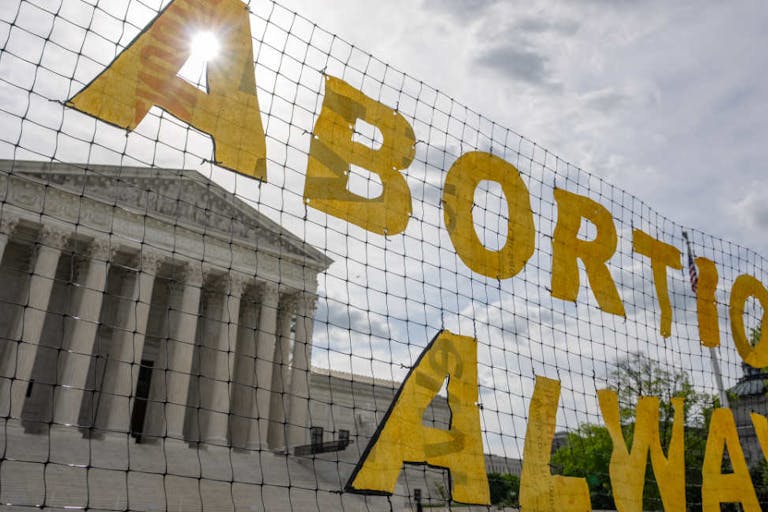
A growing number of Americans call themselves ‘pro-choice’ – but what’s really behind it?
Nancy Flanders
·
The Mississippi personhood fight wasn’t a total loss
The failure of the Mississippi personhood amendment is disappointing but not surprising—the public’s general confusion on abortion, mixed messages from MI Governor Haley Barbour, and even division within the pro-life movement about the amendment’s strategic wisdom formed a perfect storm of antipathy among moderate voters and ambivalence among pro-life ones. But despite Mississippi’s 16-point decision not to protect the unborn, the initiative was not a wasted effort.
There are two basic tendencies in politics that work to pro-lifers’ detriment: first, the belief that abortion is a mere “social issue” of secondary importance to things like the nation’s economic health or fiscal solvency; and second, politicians’ natural tendency to let polls dictate what they talk about.
As a result, politicians and mainstream commentators rarely discuss abortion, and when they do, it’s only in response to some tangential controversy, like Planned Parenthood’s misbehavior or abortion funding in healthcare reform. With voters not rethinking abortion because nobody mentions it and nobody mentioning it because voters don’t want to change it, abortion’s political intractability becomes a self-fulfilling prophecy.
By waiting for public opinion to catch up rather than actively guiding it in the right direction, we’ve fallen into the habit of holding the line rather than capturing new territory. Victories on the tangential controversies are supposed to be stepping stones toward the destination, but too often we leave the impression that they are the destination. During the healthcare debate we heard that Americans shouldn’t be forced to fund procedures they consider immoral, but not the bigger point—why it’s right to consider abortion immoral. In condemning Planned Parenthood, we sometimes fail to remind people that even if they weren’t lying about heartbeats or ignoring statutory rape, their business would still be monstrous and un-American.
Article continues below
Dear Reader,
In 2026, Live Action is heading straight where the battle is fiercest: college campuses.
We have a bold initiative to establish 100 Live Action campus chapters within the next year, and your partnership will make it a success!
Your support today will help train and equip young leaders, bring Live Action’s educational content into academic environments, host on-campus events and debates, and empower students to challenge the pro-abortion status quo with truth and compassion.
Invest in pro-life grassroots outreach and cultural formation with your DOUBLED year-end gift!
We’re simply missing too many opportunities to move the conversation beyond ultrasounds or tax dollars and toward making the central pro-life argument—the preborn are living, individual humans with unalienable rights of their own which government must protect.
That’s where pro-life initiatives prove their worth, even when they fail. Just getting them on the ballot guarantees a lengthy public debate on the right to life, with politicians opining, activists speaking out, free publicity in the news coverage, etc.—none of which usually happens without either an election or a scandal to act as a catalyst. Even when the likelihood of defeat at the polls is known going in, such campaigns create brand-new platforms from which to call attention to the pro-life argument and nudge public opinion, bit by bit, in the right direction.
Tempting though it may be, pro-lifers shouldn’t succumb to despair this week. We may not have saved the unborn in Mississippi, but we drew Mississippi’s—and the rest of the nation’s—attention to why the unborn need saving. Time will tell just how many hearts and minds were reached in the process.
Live Action News is pro-life news and commentary from a pro-life perspective.
Contact editor@liveaction.org for questions, corrections, or if you are seeking permission to reprint any Live Action News content.
Guest Articles: To submit a guest article to Live Action News, email editor@liveaction.org with an attached Word document of 800-1000 words. Please also attach any photos relevant to your submission if applicable. If your submission is accepted for publication, you will be notified within three weeks. Guest articles are not compensated (see our Open License Agreement). Thank you for your interest in Live Action News!

Nancy Flanders
·
International
Angeline Tan
·
Pop Culture
Cassy Cooke
·
International
Cassy Cooke
·
Analysis
Cassy Cooke
·
Analysis
Angeline Tan
·
Guest Column
Calvin Freiburger
·
Abortion Pill Reversal
Calvin Freiburger
·
Guest Column
Calvin Freiburger
·
Abortion Pill Reversal
Calvin Freiburger
·
Activism
Calvin Freiburger
·